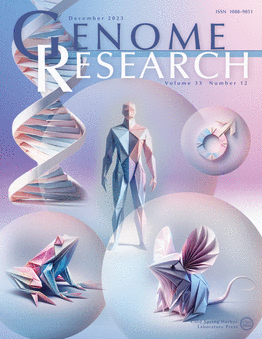Highly accurate assembly polishing with DeepPolisher
IF 6.2
2区 生物学
Q1 BIOCHEMISTRY & MOLECULAR BIOLOGY
引用次数: 0
Abstract
Accurate genome assemblies are essential for biological research, but even the highest quality assemblies retain errors caused by the technologies used to construct them. Base-level errors are typically fixed with an additional polishing step that uses reads aligned to the draft assembly to identify necessary edits. However, current methods struggle to find a balance between over- and under-polishing. Here, we present an encoder-only transformer model for assembly polishing called DeepPolisher, which predicts corrections to the underlying sequence using PacBio HiFi read alignments to a diploid assembly. Our pipeline introduces a method, PHARAOH (Phasing Reads in Areas Of Homozygosity), which uses ultra-long ONT data to ensure alignments are accurately phased and to correctly introduce heterozygous edits in falsely homozygous regions. We demonstrate that the DeepPolisher pipeline can reduce assembly errors by approximately half, mostly driven by reductions in indel errors. We have applied our DeepPolisher-based pipeline to 180 assemblies from the next Human Pangenome Reference Consortium (HPRC) data release, producing an average predicted Quality Value (QV) improvement of 3.4 (54% error reduction) for the majority of the genome.使用DeepPolisher进行高精度装配抛光
精确的基因组组装对生物学研究至关重要,但即使是最高质量的组装也会因构建它们的技术而产生错误。基本级错误通常通过额外的抛光步骤来修复,该步骤使用与草稿程序集对齐的读取来识别必要的编辑。然而,目前的方法很难在抛光过度和抛光不足之间找到平衡。在这里,我们提出了一个仅用于组装抛光的编码器变压器模型,称为DeepPolisher,它使用PacBio HiFi读取对二倍体组装的校准来预测对底层序列的修正。我们的产品线引入了一种方法,法老(纯合子区域的相位读取),它使用超长的ONT数据来确保准确地分阶段比对,并正确地在错误的纯合子区域引入杂合编辑。我们证明了DeepPolisher管道可以将装配误差减少大约一半,主要是由于indel误差的减少。我们将基于deeppolisher的管道应用于下一次人类泛基因组参考联盟(HPRC)数据发布的180个装配,对大多数基因组产生平均预测质量值(QV)提高3.4(误差减少54%)。
本文章由计算机程序翻译,如有差异,请以英文原文为准。
求助全文
约1分钟内获得全文
求助全文
来源期刊

Genome research
生物-生化与分子生物学
CiteScore
12.40
自引率
1.40%
发文量
140
审稿时长
6 months
期刊介绍:
Launched in 1995, Genome Research is an international, continuously published, peer-reviewed journal that focuses on research that provides novel insights into the genome biology of all organisms, including advances in genomic medicine.
Among the topics considered by the journal are genome structure and function, comparative genomics, molecular evolution, genome-scale quantitative and population genetics, proteomics, epigenomics, and systems biology. The journal also features exciting gene discoveries and reports of cutting-edge computational biology and high-throughput methodologies.
New data in these areas are published as research papers, or methods and resource reports that provide novel information on technologies or tools that will be of interest to a broad readership. Complete data sets are presented electronically on the journal''s web site where appropriate. The journal also provides Reviews, Perspectives, and Insight/Outlook articles, which present commentary on the latest advances published both here and elsewhere, placing such progress in its broader biological context.
 求助内容:
求助内容: 应助结果提醒方式:
应助结果提醒方式:


